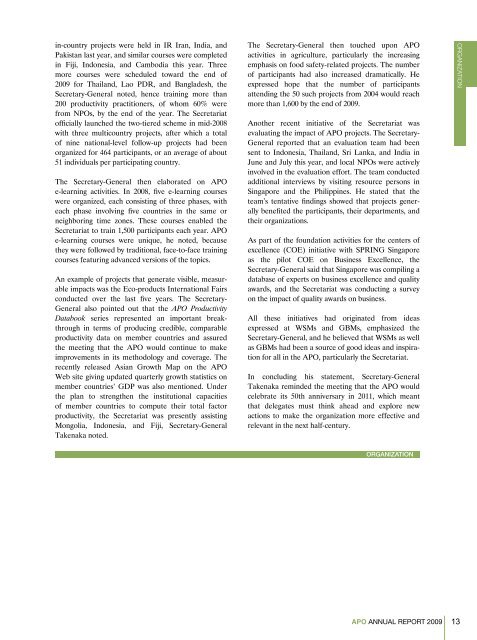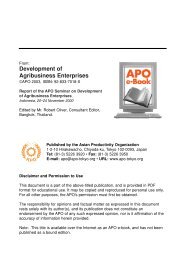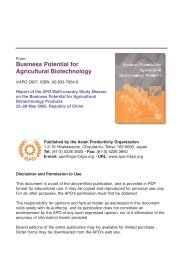Annual Report 2009 - Asian Productivity Organization
Annual Report 2009 - Asian Productivity Organization
Annual Report 2009 - Asian Productivity Organization
Create successful ePaper yourself
Turn your PDF publications into a flip-book with our unique Google optimized e-Paper software.
in-country projects were held in IR Iran, India, and<br />
Pakistan last year, and similar courses were completed<br />
in Fiji, Indonesia, and Cambodia this year. Three<br />
more courses were scheduled toward the end of<br />
<strong>2009</strong> for Thailand, Lao PDR, and Bangladesh, the<br />
Secretary-General noted, hence training more than<br />
200 productivity practitioners, of whom 60% were<br />
from NPOs, by the end of the year. The Secretariat<br />
officially launched the two-tiered scheme in mid-2008<br />
with three multicountry projects, after which a total<br />
of nine national-level follow-up projects had been<br />
organized for 464 participants, or an average of about<br />
51 individuals per participating country.<br />
The Secretary-General then elaborated on APO<br />
e-learning activities. In 2008, five e-learning courses<br />
were organized, each consisting of three phases, with<br />
each phase involving five countries in the same or<br />
neighboring time zones. These courses enabled the<br />
Secretariat to train 1,500 participants each year. APO<br />
e-learning courses were unique, he noted, because<br />
they were followed by traditional, face-to-face training<br />
courses featuring advanced versions of the topics.<br />
An example of projects that generate visible, measurable<br />
impacts was the Eco-products International Fairs<br />
conducted over the last five years. The Secretary-<br />
General also pointed out that the APO <strong>Productivity</strong><br />
Databook series represented an important breakthrough<br />
in terms of producing credible, comparable<br />
productivity data on member countries and assured<br />
the meeting that the APO would continue to make<br />
improvements in its methodology and coverage. The<br />
recently released <strong>Asian</strong> Growth Map on the APO<br />
Web site giving updated quarterly growth statistics on<br />
member countries’ GDP was also mentioned. Under<br />
the plan to strengthen the institutional capacities<br />
of member countries to compute their total factor<br />
productivity, the Secretariat was presently assisting<br />
Mongolia, Indonesia, and Fiji, Secretary-General<br />
Takenaka noted.<br />
The Secretary-General then touched upon APO<br />
activities in agriculture, particularly the increasing<br />
emphasis on food safety-related projects. The number<br />
of participants had also increased dramatically. He<br />
expressed hope that the number of participants<br />
attending the 50 such projects from 2004 would reach<br />
more than 1,600 by the end of <strong>2009</strong>.<br />
Another recent initiative of the Secretariat was<br />
evaluating the impact of APO projects. The Secretary-<br />
General reported that an evaluation team had been<br />
sent to Indonesia, Thailand, Sri Lanka, and India in<br />
June and July this year, and local NPOs were actively<br />
involved in the evaluation effort. The team conducted<br />
additional interviews by visiting resource persons in<br />
Singapore and the Philippines. He stated that the<br />
team’s tentative findings showed that projects generally<br />
benefited the participants, their departments, and<br />
their organizations.<br />
As part of the foundation activities for the centers of<br />
excellence (COE) initiative with SPRING Singapore<br />
as the pilot COE on Business Excellence, the<br />
Secretary-General said that Singapore was compiling a<br />
database of experts on business excellence and quality<br />
awards, and the Secretariat was conducting a survey<br />
on the impact of quality awards on business.<br />
All these initiatives had originated from ideas<br />
expressed at WSMs and GBMs, emphasized the<br />
Secretary-General, and he believed that WSMs as well<br />
as GBMs had been a source of good ideas and inspiration<br />
for all in the APO, particularly the Secretariat.<br />
In concluding his statement, Secretary-General<br />
Takenaka reminded the meeting that the APO would<br />
celebrate its 50th anniversary in 2011, which meant<br />
that delegates must think ahead and explore new<br />
actions to make the organization more effective and<br />
relevant in the next half-century.<br />
ORGANIZATION<br />
APO ANNUAL REPORT <strong>2009</strong> 13<br />
ORGANIZATION
















